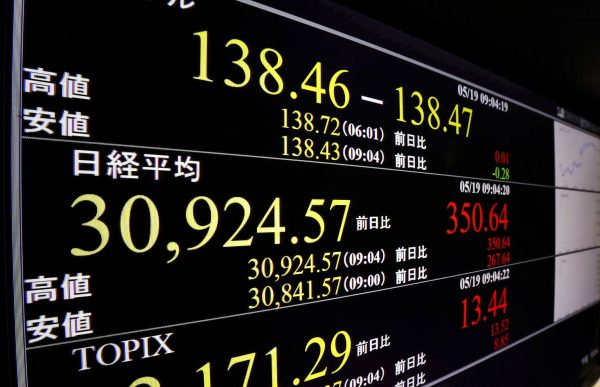The Japanese stock market has experienced an impressive upswing. Since January 2023, the Nikkei 225 index has risen by around 30 per cent — by far outperforming US and European stocks. The boom is driven by foreign investors, with Berkshire Hathaway CEO Warren Buffet’s Japan visit seen as a ‘stamp of approval’ for investing in Japan.
The boom is surprising because since early 2023 the corporate sector has had no positive news concerning innovations that would boost the international competitiveness of Japanese products. As the Bank of Japan (BoJ) has hardly lifted interest rates, financing conditions have remained benign, allowing corporations to postpone restructuring.
Prime Minister Fumio Kishida’s new capitalism has not come with comprehensive structural reforms. The Japanese education system continues to fail to produce innovative human capital and the fast-ageing society is becoming an increasing constraint on labour supply. From this perspective, Japan’s growth perspectives remain gloomy. The boom seems more financial than real, supported by historically low real interest rates in Japan.
Foreigners drove the June 2023 Japanese stock market surge. In the United States and the euro area, the sharp inflation increase since mid-2021 has prompted central banks to lift interest rates high. This has clouded growth perspectives.
As financing costs for corporations have substantially increased and the value of bonds in the balance sheets of banks has declined, financial instability has emerged. With strong wage claims perpetuating inflation, a recession in the United States and Europe may be inevitable to tame inflation.
This seems to have tempted foreign investors to reshuffle funds to Japan, where the pressure on the BoJ to increase interest rates is lower and inflation has been less pronounced, standing at 3.3 per cent in June 2023.
Central Bank Governor Kazuo Ueda remains committed to the yield curve targeting. The average credit interest rate was at 0.7 per cent in June 2023 and the 10-year government yield has remained below 0.5 per cent. With US and European interest rates rising high relative to Japan, the Japanese yen has depreciated by 36.3 per cent against the dollar since January 2021. This has made Japanese stocks cheap in terms of US dollars.
Despite the slight easing of the yield curve control in July 2023, in the medium-term the scope to increase interest rates for the BoJ remains limited. With government debt amounting to 1437 trillion yen, raising interest rates would fiscally paralyse the Japanese government.
The BoJ’s large asset purchases have created large deposits for the commercial banks at the BoJ (549 trillion yen as of March 2023). Lifting the interest rates on commercial banks’ deposits by only one percentage point would generate painful interest rate expenses for BoJ of about 5.5 trillion yen.
This implies that Japanese corporations can continue to expect public support via benign financing conditions. With the BoJ continuing to buy government bonds — the equivalent of roughly 70 trillion yen in the first half of 2023 — the Japanese government can also remain supportive of aggregate business activity. There is also a larger scope for subsidies, which were announced for semiconductor and battery production.
Domestically, the yen’s depreciation boosted the revenues of large export-oriented Japanese enterprises. At the same time, depreciation made the acquisition of foreign assets more expensive and repurchases of Japanese stocks more attractive. In 2022, stock repurchases by Japanese corporations reached a historical peak of 9.2 trillion yen. For 2023, SMBC Nikko Securities has already recorded a volume of 4.6 trillion yen as of mid-May.
While the Nikkei 225 is slowly reapproaching its peak before the bubble economy bursts, the new stock market miracle seems driven by state intervention — as previously in the case of Abenomics. On top of direct and indirect subsidies, the BoJ has in the past bought large amounts of exchange-traded funds (ETFs). As of June 2023, it held about 57 trillion yen (37 trillion yen in book value) in ETFs. This equated to 81 per cent of all Japanese ETFs.
Whereas the Japanese government and the BoJ keep zombifying Japanese corporations, interest rate increases in the United States and Europe will exert pressure on US and European corporations to increase efficiency and push forward innovation. This suggests that the long-term fundamental growth prospects of stock markets are in favour of the United States.
Japan and its corporations will only be able to recuperate their past strength if the BoJ follows the interest rate policy of the US Federal Reserve. Doing so will prompt the corporations to increase efficiency and urge the government to implement decisive structural reforms.
Taiki Murai is Research Assistant at the Institute for Economic Policy, Leipzig University.
Gunther Schnabl is Professor of Economic Policy and International Economics at Leipzig University.

